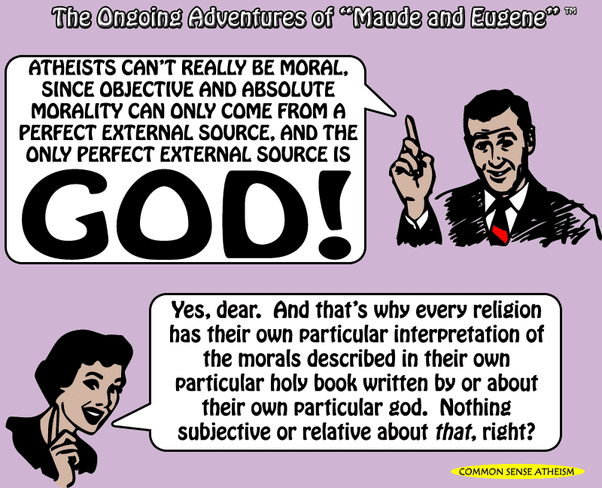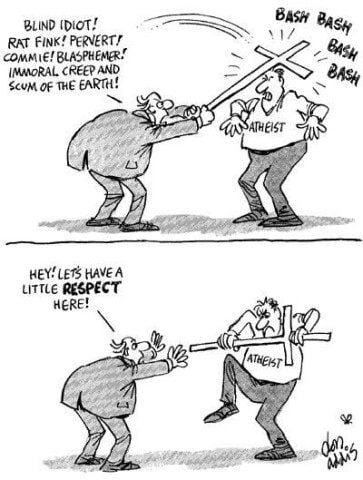
Recently, I received the follow comment:
Just curious on your thoughts about humans having, wanting and giving of love. Curious on where you believe it comes from.
Also, in your opinion, if there is no God or creator, who makes the morality rules?
Some believe that mankind is ultimately the moral law maker and or compass, in your opinion can anyone change that moral level as they see fit?
If the moral conduct is changed by the masses to whatever works for you, would that be counterproductive to society? Or do you feel mankind is evolving into learning and understanding what is helpful or not helpful to the whole? I hope all this makes sense. If not I will try to clarify.
I appreciate your time to respond.
Generally, I don’t engage is discussions about morality. Been there, done that, so to speak. I have been attacked by Christians and atheists alike over my views on morality. I have been accused of all sorts of “sins.” So, I am not inclined to write about morality, but today I have decided to do so, knowing that new readers have not read my views on this subject.
I am an atheist, so there is no God, no creator, no divine lawgiver. The laws and commands found in the Bible are of human origin. No Christian apologist has provided any evidence to suggest otherwise. Saying, THE BIBLE SAYS, is not evidence; it is an assumption rooted in presuppositionalism. That said, the Bible can be a helpful voice in discussions about morality, showing us how ancient societies viewed morality.
All morality is inherently subjective. There’s no such thing as absolute morality. Even in the Bible, we see morality, including God’s, changing over time. The idea that the Ten Commandments (which version?) or the Bible (which translation?) are an objective moral standard for all people for all time is absurd. History reveals ever-changing moral beliefs and standards. I came of age in the Independent Fundamentalist Baptist (IFB) church. IFB churches and pastors believe in absolute morals, yet most IFB churches have moral standards today different from those they had in the 1960s and 1970s. This is especially so for Evangelicals. Yet, these moralizers, with great gusto, proclaim that they are keepers, defenders, and proclaimers of God’s moral standard.
Humans are social creatures, and as such, we need rules by which to govern ourselves. If morality is subjective, who decides what rules to use to govern our societies? We do. There’s no higher standard than “we the people.” If happiness and well-being are our goals — and they are (or should be) — then our morals should reflect those goals. Whether these morals can then be considered objective is a matter of debate, a debate, by the way, that I have no interest in. I know that humans generally agree that murder, rape, child sexual abuse, kidnapping, etc., are morally wrong. We don’t need a deity (or a church/preacher/religious text) to tell us these things are wrong. Why we know these things are wrong is an interesting discussion, one that has provoked much debate. Personally, I am convinced that our moral beliefs are shaped by biology, environment, culture, parental training, education, economic status, religion, and other factors. As you can see, it is far easier to appeal to God or the Bible — no thinking required. However, as stated above, I am an atheist (and a humanist and a socialist). God and the Bible have no place in my thinking.
Since morality is inherently subjective, our morals can and do change over time. And this is what troubles Fundamentalists. They live in a bubble where change is banned (even though a careful analysis shows transformational change taking place in Evangelical churches). Fundamentalists pine for the 1950s, a time when gays were deep in the closet, women were barefoot and pregnant, and Blacks knew their place. The foundation of the culture war is a yearning for what is perceived (falsely) as better times.
Progress demands we continue to examine our moral beliefs and adjust them accordingly. As long as Fundamentalists continue to clamor for, and achieve, a return to “old-fashioned” moral beliefs, progress is impeded. The current spate of anti-transgender, anti-abortion, and pro-creationism laws seems laughable to skeptics and rationalists, but state after state are passing these laws, moving us closer to the “good-old-days.” We must never, ever forget that theocracy (a system of morality) is their goal.
Bruce Gerencser, 68, lives in rural Northwest Ohio with his wife of 47 years. He and his wife have six grown children and sixteen grandchildren. Bruce pastored Evangelical churches for twenty-five years in Ohio, Texas, and Michigan. Bruce left the ministry in 2005, and in 2008 he left Christianity. Bruce is now a humanist and an atheist.
Your comments are welcome and appreciated. All first-time comments are moderated. Please read the commenting rules before commenting.
You can email Bruce via the Contact Form.



